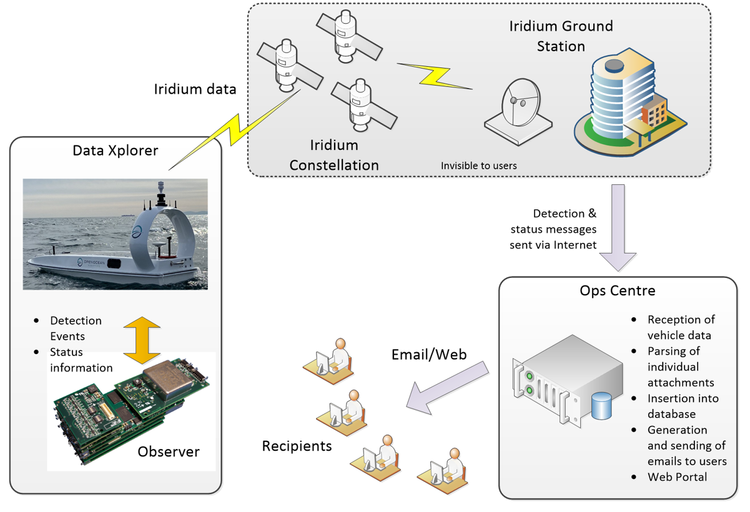Doing Business on Mighty Waters - Uncrewed
In their article titled Doing Business on Mighty Waters - Uncrewed published in the Marine Mammals special issue of ECO Magazine, JASCO Applied Sciences’ John Moloney and Open Ocean Robotics’ Julie Angus discuss the ‘Marine Mammal Monitoring Service via Uncrewed Surface Vessel’ project, sponsored by Defence Research and Development Canada (DRDC) for the Innovations Solutions Canada program.
From the article:
“In March 2022, JASCO Applied Sciences (JASCO) and Open Ocean Robotics (OOR) hosted a demonstration of the Marine Mammal Monitoring Service at the Canadian Forces Experimental and Test Range (CFMETR) in Nanoose, British Columbia. This demonstration was supported by a vehicle deployment and recovery team in Nanoose, a piloting team in Victoria, BC, and an acoustic analyst team in Halifax, NS. Invited guests from the Department of National Defence (DND), Department of Fisheries and Oceans (DFO), Transport Canada, Environment Canada, and other agencies attended via the internet from their offices across the nation. They were able to effectively participate in the listening for marine mammals, measurement of underwater noise, maintaining visual surveillance, search for nearby vessels and understand the weather conditions at CFMETR, all from the comfort of their offices and with no personnel deployed into the Salish Sea.”
“As a young Officer in the Canadian Navy in the 1980’s, much of my training was done in the passage ways, fjords, and islands between Vancouver Island and the mainland, along the coast of beautiful British Columbia and Alaska. It was normal to spot pods of orcas or the occasional humpback whale while on lookout for deadhead logs. The backdrop for this naval training was breath-taking ecosystems teeming with marine life and postcard vistas. It was easy to understand how precious the resident and transient marine mammals of this area are to the world. During my career in the Navy, I trained to hunt for Soviet submarines using loud active hull-mounted and variable depth sonars. There was no consideration for the effects of these sonar systems on marine life during military training missions and exercises.”
“The combination of marine robots and intelligent underwater acoustic systems to protect ocean fauna is only in its infancy, yet it shows considerable promise to mitigate impact, reduce monitoring costs and keep humans out of harm’s way. OOR and JASCO are helping transform science-fiction into reality and are helping define the way marine mammal monitoring will be done in the future. The Marine Mammal Monitoring Service project, and the environmental imperative it supports, makes me wish I was just starting my voyage in the ocean industry rather than nearing the final mark.”
Read the full article or browse the entire ECO Magazine Marine Mammal issue.
About JASCO Applied Sciences
JASCO Applied Sciences is a world leader in the science of underwater sound and its effects on marine life. A global company founded in Victoria, Canada, in 1981, JASCO provides services from offices in Canada, the United States, the United Kingdom, Germany, and Australia. We provide support for all stages of environmental reviews and assessments of underwater sound for the renewable energy, oil and gas, marine construction, shipping, and defence sectors. We design, develop, and manufacture state-of-the-art oceanographic data acquisition systems to meet project demands for quality, endurance, reliability, and performance. We enable our clients to satisfy regulatory requirements by providing scientifically defensible assessments of their projects to government regulators and the public. For more information, visit: www.jasco.com.
About SeaTrac Systems, Inc.
SeaTrac Systems, Inc. manufactures, sells, and leases cost-effective, multi-purpose, long-endurance solar-powered Uncrewed Surface Vehicles (USVs) for commercial, scientific, and military applications. SeaTrac’s USV can carry various sensors and custom payload modules that make it perfect for research, monitoring, or surveillance tasks where autonomy, cost, and ease of deployment matter. For more information, visit our website at seatrac.com.


